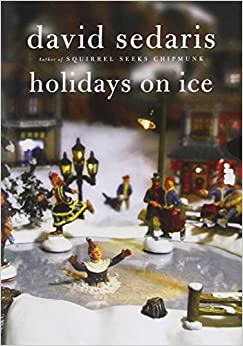David Sedaris – “Holidays on Ice” and “Calypso”
Hachette Australia
 David Sedaris is many things – accomplished author, radio host and humourist but first and foremost a master when it comes to observation of the human condition and the often comical side-effects and faux-pas, which he sheds light on in his own idiosyncratic cheerful yet oftentimes subtly dark and misanthropic ways. Needless to say that Sedaris has entered the canon of mainstream literary culture a long time ago and subsequently draws large crowds wherever he holds court.
David Sedaris is many things – accomplished author, radio host and humourist but first and foremost a master when it comes to observation of the human condition and the often comical side-effects and faux-pas, which he sheds light on in his own idiosyncratic cheerful yet oftentimes subtly dark and misanthropic ways. Needless to say that Sedaris has entered the canon of mainstream literary culture a long time ago and subsequently draws large crowds wherever he holds court.
Since it has been a while since I read Sedaris’ excellent first emissions, it was time to check in to see how his approach has evolved with his recent books.
With a telling title, “Holidays on Ice” has its foci firmly set on the Christmas season and the mindless consumption and blind indulging it comes with along with the emotional baggage that sooner or later is bound to find its way to the surface during family gatherings.
While Sedaris Christmassy explorations do not necessarily unearth anything groundshakingly new, but his strength has always been that he realistically positions himself smack bang in the middle of the action as not merely a critic but a participant – in for a penny, in for a pound.
“Holidays on Ice” is infused by Sedaris’ dry wit and smart observations, which specifically works when he sets his aim at anything American. Having relocated to France quite a while ago, his writings about European customs and occurrences, however, are more that of an amused travel reporter dispatching snapshots back home – in so far my impression of “Holidays on Ice” was very much in line with what I derived from his early publications.
 “Calypso” constitutes Sedaris’ tenth collection of essays centred around his family and close circle and I found it an interesting departure from his usual style as there seems to be an added layer of empathy that elevates his musings and makes them rawer, realer and at times a bid sadder than what he scripted in its predecessors.
“Calypso” constitutes Sedaris’ tenth collection of essays centred around his family and close circle and I found it an interesting departure from his usual style as there seems to be an added layer of empathy that elevates his musings and makes them rawer, realer and at times a bid sadder than what he scripted in its predecessors.
“Calypso” shows how Sedaris has mastered his craft and that he can expertly pull the strings and levers with very minimal effort to elicit reactions when he exposes foibles with surgical precision, which in many instances must resonate with the recipient, especially if they belong to the target group of being middle-aged.
Things get raw when Sedaris examines the impact of his sister’s suicide and its impact on his identity both as a person and a writer, which is where growth shows that goes beyond the realm of mere comedic impact – Sedaris is transcending the persona he has established for himself and not only plays with emotions but does so in a manner that feels more real and truthful than before.